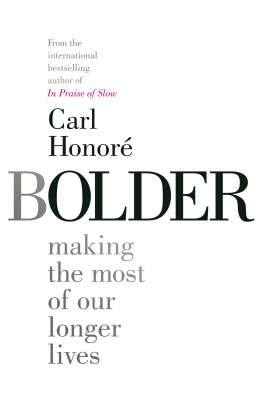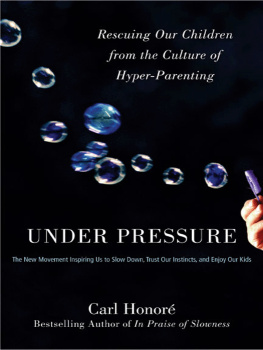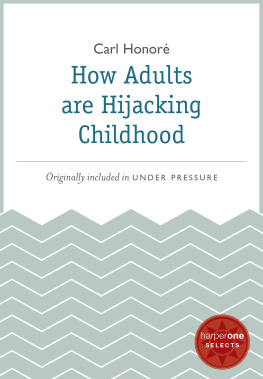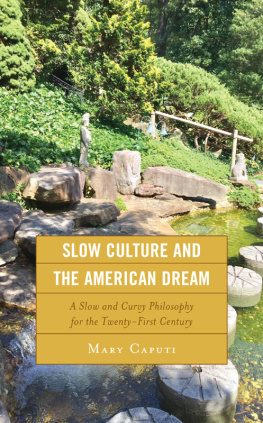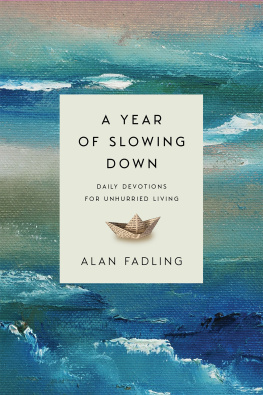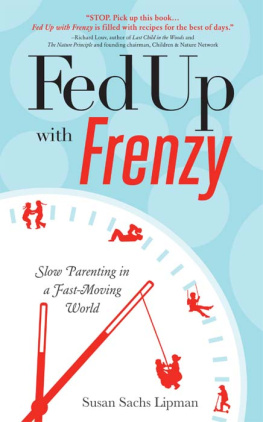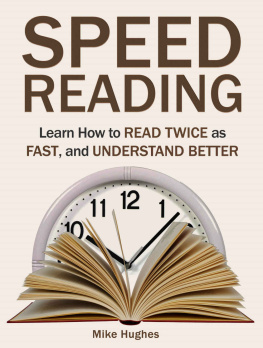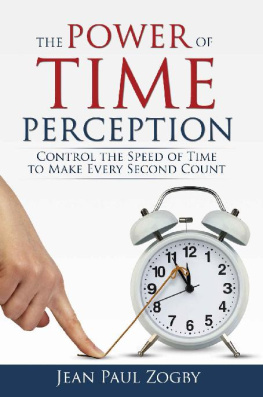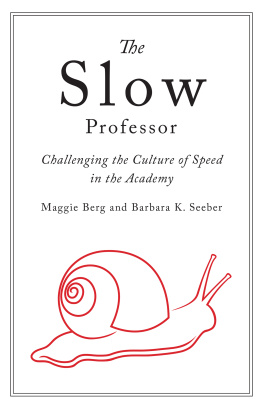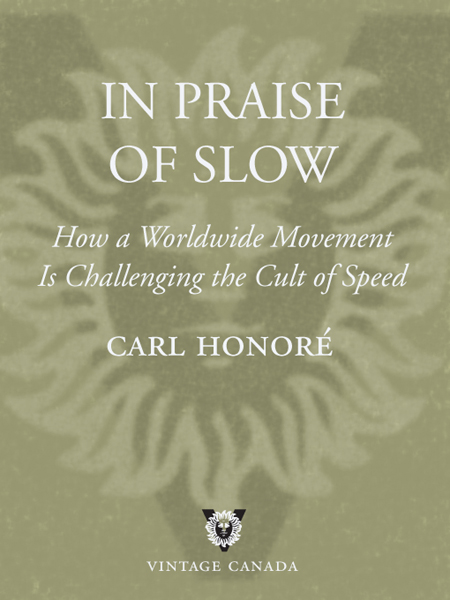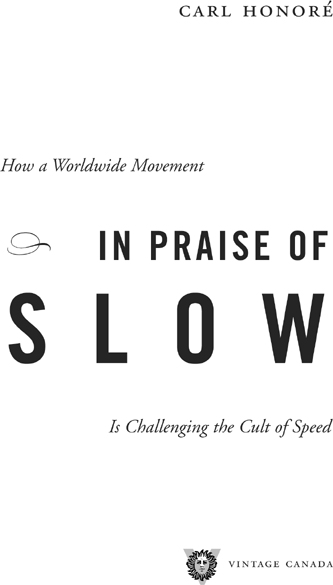Acclaim for In Praise of Slow
Honor is no true-believerhe questions every aspect of the Slow movement and keeps coming up with the conclusion that it just makes sense: life in the slow lane is more enjoyable, more pleasurable, more humane. This is a remarkable book that should be read by every resident of todays frenzied urban world.
Mark Frutkin, author of The Lion of Venice
In this terrific book, Carl Honor gets to the heart of whats ailing western industrial societiesour obsession with productivity, speed and consumerismbut he doesnt stop with the gloom and doom. Instead, he shows the way out, with inspiring examples from the growing worldwide Slow movement. Take the time to read this important, excellently written bookour future depends on the ideas it contains!
John de Graaf, editor of Take Back Your Time
The speed of life borders on insanity for an increasing number of us, and the price we pay is the erosion of our happiness and health. If you sometimes feel engulfed by the mad pace of modern lifeand who doesnt?In Praise of Slow could prove life-saving.
Larry Dossey, M.D., author of Reinventing Medicine
Entrepreneur and slow may seem like oxymorons. However, taking the time to read In Praise of Slow may be the best decision an entrepreneur, or anyone working full time, can make.
Gary Erickson, Entrepreneur, CEO of Clif Bar Inc. and author of Raising the Bar
Its about time someone took issue with the underlying mentality that sets our daily metronome. Those who savour this hopeful book one chapter at a time will be the biggest winners. Its seductively crafted in this way measuring out its subversive but ultimately healing message.
Edmonton Journal
Honor is particularly good at detailing the addictive properties and vagaries of speed, and its ill effects on individuals and society, including himself.
The Globe and Mail
Part reportage, part manifesto, In Praise of Slow is an engaging, well-written journey into the various ways that people around the globe have attempted to live more patiently.
Star Tribune (Minneapolis)
Its about time someone insistedin intelligent, persuasive languagethat we all put on the brakes, or at least check the instruments on the dashboard. Through anecdote, statistic and argument, Honor wants to convert us to an atheism that is opposed to this cultures mad theology of speed.
Billy Collins, former American Poet Laureate
This charmingly written exploration of the quiet life is so good, you have to resist the temptation to race through it. Honors cynicism combined with a fascination for the subject make this a million times more inspiring than any of the mass of self-help books around on downshifting. A rare treat to be savouredat your own pace, of course.
Sunday Express (UK)
Entertaining [a] friendly and intelligent guide with a light mix of well-researched historic trivia and contemporary statistics. [Honors] anecdotes and self-deprecating humour convey the pleasure and reward that he experienced on his slow pilgrimage.
The Economist
Superb and eminently readable Honor has written an incisive overview of an important cultural phenomenon.
Spirituality and Health
The novelty of Honors approach lies in its practicality.
The Japan Times
This elegant meditation on the pace of our lives is so seductive that the pages seem to slowly turn themselves. Honor makes a case for relishing life in all its facets, from eating and reading to being connected to our communities. His style is as graceful as are his thoughts, which allows his voluminous research to fold seamlessly into the narrative.
Book Sense Picks
To Miranda, Benjamin and Susannah
CONTENTS
ONE
TWO
THREE
FOUR
FIVE
SIX
SEVEN
EIGHT
NINE
TEN

There is more to life than increasing its speed.
G ANDHI
INTRODUCTION
T H E A G E O F R A G E
People are born and married, and live and die, in the midst of an uproar so frantic that you would think they would go mad of it.
W ILLIAM D EAN H OWELLS , 1907
O N A SUN-BLEACHED AFTERNOON in the summer of 1985, my teenage tour of Europe grinds to a halt in a square on the outskirts of Rome. The bus back into town is twenty minutes late and shows no sign of appearing. Yet the delay does not bother me. Instead of pacing up and down the sidewalk, or calling the bus company to lodge a complaint, I slip on my Walkman, lie down on a bench and listen to Simon and Garfunkel sing about the joys of slowing down and making the moment last. Every detail of the scene is engraved on my memory: two small boys kick a soccer ball around a medieval fountain; branches scrape against the top of a stone wall; an old widow carries her vegetables home in a net bag.
Fast-forward fifteen years, and everything has changed. The scene shifts to Romes busy Fiumicino Airport, and I am a foreign correspondent rushing to catch a flight home to London. Instead of kickin down the cobblestones and feelin groovy, I dash through the departure lounge, silently cursing anyone who crosses my path at a slower pace. Rather than listen to folk music on a cheap Walkman, I talk on a mobile phone to an editor thousands of miles away.
At the gate, I join the back end of a long lineup, where there is nothing to do except, well, nothing. Only I am no longer capable of doing nothing. To make the wait more productive, to make it seem less like waiting, I start skimming a newspaper. And that is when my eyes come upon the article that will inspire me eventually to write a book about slowing down.
The words that stop me in my tracks are: The One-Minute Bedtime Story. To help parents deal with time-consuming tots, various authors have condensed classic fairy tales into sixty-second sound bites. Think Hans Christian Andersen meets the executive summary. My first reflex is to shout Eureka! At the time, I am locked in a nightly tug-of-war with my two-year-old son, who favours long stories read at a gentle, meandering pace. Every evening, though, I steer him towards the shortest books and read them quickly. We often quarrel. Youre going too fast, he cries. Or, as I make for the door, I want another story! Part of me feels horribly selfish when I accelerate the bedtime ritual, but another part simply cannot resist the itch to hurry on to the next thing on my agendasupper, emails, reading, bills, more work, the news bulletin on television. Taking a long, languid stroll through the world of Dr. Seuss is not an option. It is too slow.
So, at first glance, the One-Minute Bedtime series sounds almost too good to be true. Rattle off six or seven stories, and still finish inside ten minuteswhat could be better? Then, as I begin to wonder how quickly Amazon can ship me the full set, redemption comes in the shape of a counter-question: Have I gone completely insane? As the departure lineup snakes towards the final ticket check, I put away the newspaper and begin to think. My whole life has turned into an exercise in hurry, in packing more and more into every hour. I am Scrooge with a stopwatch, obsessed with saving every last scrap of time, a minute here, a few seconds there. And I am not alone. Everyone around mecolleagues, friends, familyis caught in the same vortex.


